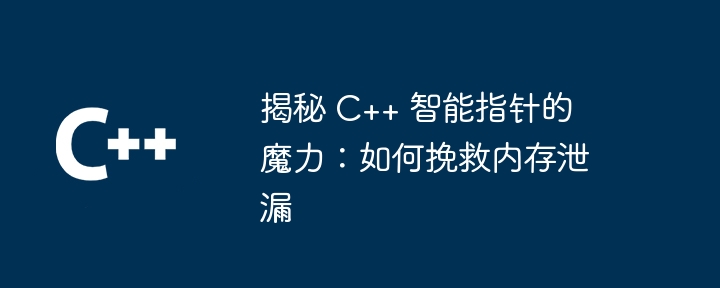Home >Backend Development >C++ >Revealing the magic of C++ smart pointers: how to save memory leaks
Revealing the magic of C++ smart pointers: how to save memory leaks
- 王林Original
- 2024-05-09 14:21:02475browse
Smart pointer is a wrapper class that manages the life cycle of native pointers, avoiding the common memory leak problem in C. Common types are: unique_ptr: a smart pointer pointing to a unique object, ensuring that there is only one owner at the same time; shared_ptr: a smart pointer pointing to a shared object, allowing multiple owners but all owners are responsible for destroying the object; weak_ptr: pointing to a shared object A smart pointer that does not increment the object's reference count.

Revealing the magic of C smart pointers: Say goodbye to memory leaks
In C programming, memory leaks are a headache question. It causes the program to consume more and more memory, eventually leading to crashes or poor performance. Smart pointers aim to solve this problem and are key to writing robust, leak-free code.
How smart pointers work
A smart pointer is a container class that encapsulates native pointers (such as int*). It is responsible for the life cycle management of pointers and automatically releases the memory pointed to when it is no longer needed.
Common smart pointer types
- unique_ptr: A smart pointer pointing to a unique object. Make sure there is only one owner at a time.
- shared_ptr: A smart pointer pointing to a shared object. Multiple owners are allowed, but all owners are responsible for destroying the object.
- weak_ptr: A smart pointer to a shared object, but does not increment the object's reference count.
Practical case
Suppose we have a Foo class:
class Foo {
public:
Foo() { cout << "Foo constructed\n"; }
~Foo() { cout << "Foo destructed\n"; }
};Example 1: Use Raw pointers
If you do not use smart pointers, the management of raw pointers is prone to errors, leading to memory leaks:
Foo* foo = new Foo(); // 创建 Foo 对象 // ... 使用 foo 对象 ... delete foo; // 记得释放内存,否则会泄漏 // ...
Example 2: Using smart pointers (unique_ptr)
Use unique_ptr, the smart pointer is responsible for destroying the object to avoid leaks:
unique_ptr<Foo> foo(new Foo()); // 创建 Foo 对象,自动释放 // ... 使用 foo 对象 ... // foo 超出作用域时,自动销毁 Foo 对象
Example 3: Using smart pointers (shared_ptr)
If there are multiple objects If you need to share a pointer, you can use shared_ptr:
shared_ptr<Foo> foo(new Foo()); // 创建 Foo 对象,按引用计数释放 shared_ptr<Foo> bar = foo; // 创建另一个指向同一 Foo 对象的指针 // ... 使用 foo 和 bar 对象 ... // 最后一个 bar 超出作用域时,Foo 对象销毁
Conclusion
Smart pointers are a powerful tool to avoid memory leaks in C. By managing the lifetime of pointers, they ensure that memory is released correctly, making code more robust and reliable.
The above is the detailed content of Revealing the magic of C++ smart pointers: how to save memory leaks. For more information, please follow other related articles on the PHP Chinese website!

